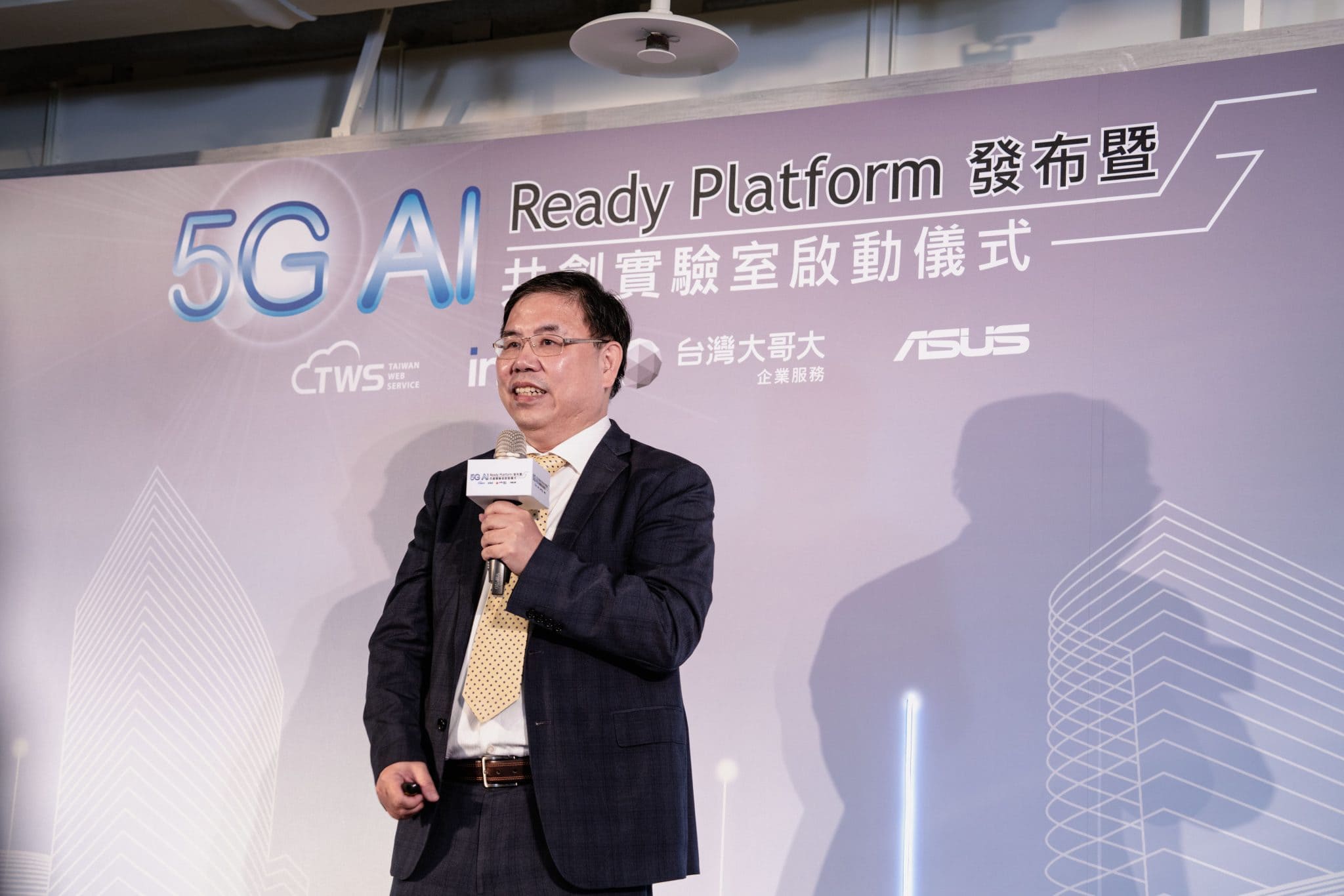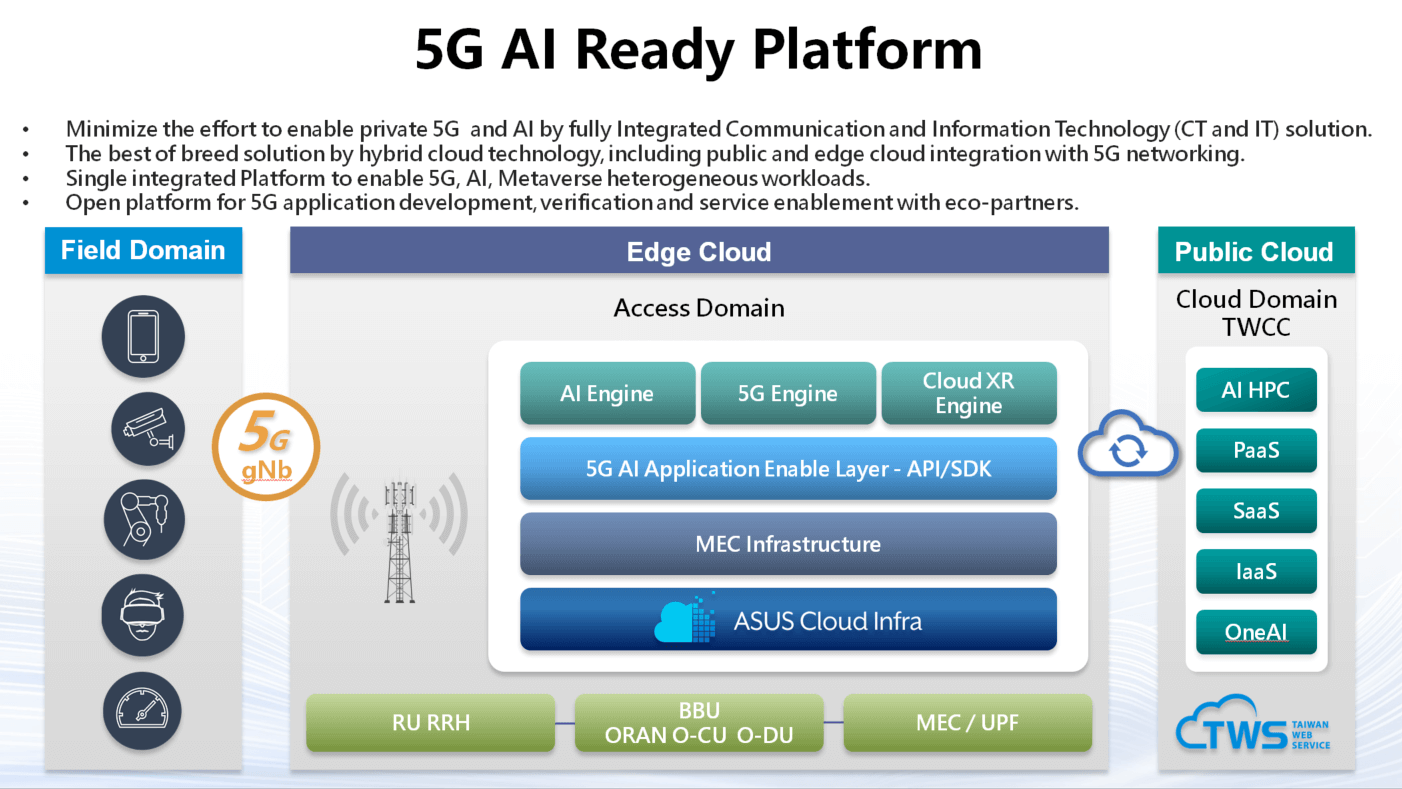3GPP standards have played a pivotal role in the success of mobile communications, making it the fastest growing cellular technology in history. Never before has a new radio technology made it to the market so quickly and widely after the finalization of the standards, further, with continuous improvement of the standards to cover diverse applications, it accelerates the new opportunities by connecting everything with 5G.
Taiwan was being an important base for the global information and communication industry, the industry, government, and academia in Taiwan have all been active in 5G technology development. In order to support private 5G market demand and opportunities, TWS and ASUS have jointly built the open infrastructure 5G AI Ready Platform and the 5G AI Co-Lab, which is Taiwan’s first 5G cloud platform integrating the cloud and 5G technology based on new generation service based architecture.
The platform combines data streaming and intelligent applications twith 5G characteristics of high transmission and low latency to connect industrial AI applications. By the alliance with industry and technology leaderTaiwan Mobile and Intel, the innovation provides wholr new opportunities for 5G applications in Taiwan.
Everything is ready for Taiwan’s private 5G network, but transformation is required.
Unlike 2G, 3G, and 4G, which are mobile communications focusing on the general consumer requirements., the 5G further extends its application to the enterprise and everything to be connect together.. The expansion of 5G applications will not only bring a wider range of opportunities and whole new user experiences, but also be an essential infrastructure for future self-driving cars and smart factories. A report by Gartner, a market research firm, predicts that 5G coverage in Tier 1 cities will reach 60% by 2024.
After the official launch of the 5G commercialization in 2020, 3GPP has developed two standards in recent years, R17 and R18, which have enhanced the features of low latency and wide connectivity. In response to this trend, many countries, including the government of Taiwan, have released frequency bands for 5G enterprise networks, and the overall market is ready to take off. However, Steve Chen, Associate Director of the ASUS Computer Cloud Architecture Software Center and CTO of Taiwan Web Service, pointed out that it seems that all is ready for the 5G private network, except for the opportunity, and “this opportunity is the open platform that integrates the power of the terminialnetwork, and cloud”.

Photo: Steve Chen, the ASUSTek Computer Director and TWS Chief Technology Officer, was introducing the 5G AI Ready Platform and the 5G AI Co-Lab at ASUS AI Cloud Innovation Park.
There are two types of 5G networks in Taiwan. One is the B2C public mobile network provided by telecommunication companies, which is a shared network service that the general mobile phone subscribers to apply. For example, sometimes it is difficult to connect the mobile internet when there are crowds of people near Taipei 101 on New Year’s Eve. The other type is the B2B enterprise private 5G network, where companies apply for a dedicated frequency band and build their own “mobile broadband private network”, also known as a 5G private network.
Steve Chen pointed out that many enterprises have invested heavily, both in capital and labor, to build their owned private 5G networks, but they don’t really know how to use them and how to integrate them with enterprise applications.
Steve Chen further explained, in order to realize the real value of 5G, the first step is to find a telecom vendor to build the infrastructure and private 5G network. The second step is for the cloud provider to build an edge cloud platform, then an AI development platform needs to be introduced to the cloud network integration platform for the software provider to develop applications tailored to the needs of enterprises. The whole process need a lot of time and money to be invested, thus most enterprises are hesitant and may delay or miss this great opportunity for transformation.
Four companies join forces to build an open platform
To help enterprises solve this problem, TWS, ASUS, and t the key strategic partners of Taiwan Mobile and Intel are working together to build a 5G AI Ready Platform and the 5G AI Co-Lab. According to Steve Chen, the four companies specialize in different territories and complement each other’s expertise in this platform to provide enterprises and ISVs (Independent Software Vendors) with a complete, end to end and immediately available open platform.
In this platform, Taiwan Mobile’s commercial telecom network equipment and commercial 5G frequencies band are currently available to provide enterprises with stable 5G business services. In addition to helping enterprises build 5G private networks, we also provide seamless switching between public and private networks for some applications to enable smooth system operation. When the 5G enterprise private network band is officially released, we will also introduce optionalenterprise private network band portfolios, including micro-base stations, and open O-RAN solutions and give enterprises different choices in scale
5G private networks must be “cloud-network integrated” to maximize system value. TWS provides two products of AIHPC-as-a-Service and Infrastructure-as-a-Service for enterprises. AIHPC-as-a-Service includes Taiwan’s largest and most powerful high performance computing, CCS container management, and One AI service, which is a one-stop AI collaboration platform. IaaS includes virtualized compute and disk, cloud object service, and high information security service.
In addition to edge cloud deployment, Steve Chen mentioned that TWS can provide enterprises with a 5G private network edge cloud, seamlessly connected to Taiwania 2, the largest AI cloud TWCC supercomputer in Taiwan, to dynamically expand the computing resources and capacity of the private network system.
However, because of the high technology entry level to enable AI in private 5G network, most enterprises and ISVs will be facing the challenge to leverage the functionality to maximize the value of the technology.
In the 5G AI Ready Platform and the 5G AI Co-Lab, the processor maker Intel provides the open Intel® oneAPI and OpenVINO™ tools to help users’ efficient execution of AI applications. On the application side, ASUS Computers has been fully committed to AIoT in recent years, achieving significant results in vertical applications such as smart healthcare, smart manufacturing, and smart city. These applications can all be built on the 5G AI Ready Platform, and enterprises can quickly leverage the value of 5G private networks on-demand.

Photo: The 5G AI Ready Platform combines CT and IT technologies to lower down the entry barriers for enterprise customers. At the same time, it integrates 5G edge cloud, public cloud (TWS), and public and private networks to create the overall maximum benefits and provide users with a platform for the further development and execution of 5G and AI applications.
Bringing together the best of all to meet enterprises’ needs for 5G deployment
Steve Chen emphasized this open platform is a collaborative effort to meet the 5G deployment needs of enterprises in various type of vertical domains. The 5G AI Ready Platform and the 5G AI Co-Lab has already got the infrastructure network, edge cloud platform, AI development tools, and AIoT vertical field systems in place, where ISVs from specific fields can collaborate to develop intelligent services, and enterprises can easily build the most suitable 5G private network architecture through the the platform.
Steve Chen said, just like all application vendors could easily put their products on the platform when the smartphone was first introduced, What we have done is to build a new generation enterprise mobile communication platform , this is the core concept of the 5G AI Ready Platform to allow both the supply and demand sides to have an open platform and smoothly deploy 5G private networks and drive digital transformation.
The official launch of Taiwan Web Service’s 5G AI Ready Platform and Co-Lab
領航發布5G-AI應用解決方案,並於華碩AI雲.jpg)
Photo: Taiwan Web Service, together with ASUS, Taiwan Mobile, and Intel, released 5G AI application solutions and held a 5G AI Ready Platform and the 5G AI Co-Lab opening ceremony at ASUS AI Cloud Innovation Park.
In order to facilitate 5G applications, TWS, together with ASUS, Taiwan Mobile, and Intel, announced 5G AI application solutions on August 3 (Wed.) and held a 5G AI Ready Platform and the 5G AI Co-Lab opening ceremony at ASUS AI Cloud Innovation Park.
The collaboration of the four companies attracted a large number of industry participants to the Park, and there was a continuous flow of people on the day. In addition to the presentation of 5G AI application solutions and the launch of the 5G AI Co-Lab, there were also many booths showcasing related applications, including road monitoring technology as a smart city solution, automated material transporters, chip yield measurement, and automated screening of qualified and unqualified products, so that companies can quickly see the benefits of 5G solutions.
For the partnership, Joe Xie, ASUS Chief Operating Officer and Global Senior Vice President, noted that ASUS will combine the technologies of AIHPC high performance computing power, cloud services, smart IoT terminals, and servers, to apply the applications in smart healthcare, smart manufacturing, and smart cities and so on.
Steve Long, General Manager of Intel Asia Pacific and Japan, said he is looking forward to the 5G AI Ready Platform and the 5G AI Co-Lab bringing more innovations to us. With Intel’s unique ability, it may integrate software, silicon, and platforms to accelerate and optimize heterogeneous workloads. The platform and lab will be of great help to end customers and ISVs, helping them to easily develop, validate and deploy with great efficiency.
Chun-Hui Wu, Chief Business Office of Corporate Services of Taiwan Mobile Enterprise Services, said that 5G has become an important global development target and that the symbiosis of “terminial, network, and cloud” is the future trend of digital innovation. This cooperation has created the first highly integrated 5G enterprise private network service in Taiwan. It is expected to empower enterprise users to accelerate the implementation of 5G and also to have more intelligent applications integrating 5G + AI key technologies in the future.
Lastly, Joe Xie said that the launch of a 5G AI cloud-network solution and the 5G AI Co-Lab in collaboration with Taiwan Mobile and Intel have completed the last mile of the AIoT vertical field. He also looks forward to working with more partners in the future to accelerate 5G applications with ASUS’ AI cloud resources and provide high-speed AI services for enterprises and start-ups.
Source:TechOrange;Photos:Shutterstock

